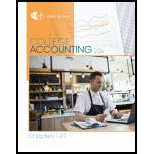
The matching principle in accounting requires the matching of debits and credits.
Identify whether the given statement is true or false.
Answer to Problem 1TF
False statement.
Explanation of Solution
Matching principle: According to this principle, the expense should be recognized when it is actually incurred, doesn’t matter, payment is made or not. This principle ensures that the expenses incurred in the current period are matched against the revenues earned in the same period. Matching principle is sometimes called as expense recognition principle.
The matching principle helps in matching the revenue earned during the year with the respective expense incurred to produce the revenue.
Therefore, for the given statement “The matching principle in accounting requires the matching of debit and credits” is false.
Want to see more full solutions like this?
Chapter 5 Solutions
College Accounting, Chapters 1-27 (New in Accounting from Heintz and Parry)
- Based on the screenshot, what is the maximim flow?arrow_forwardStar Company incurred and paid the following costs for research and development activities: Material used from inventory $ 60,000 Wages and salaries 85,000 Allocation of general and administrative costs 25,000 Depreciation on building housing multiple research and development activities 30,000 Machine purchased for research and development project that has no future alternative uses 35,000 Total $235,000 If Star includes all these costs in research and development expense, including the entire cost of the machine with no alternative future uses, which of the following would be included in the journal entry?arrow_forwardForeign currency translation—Comprehensive income A U.S.-based parent company acquired a European Union–based subsidiary many years ago. The subsidiary is in the service sector, and earns revenues and incurs expenses evenly throughout the year. The following preclosing trial balance includes the subsidiary’s original Euros-based accounting information for the year ended December 31, 2022, immediately prior to closing the company’s nominal accounts into the corresponding balance sheet accounts. It also includes the information converted into $US based on the indicated exchange rates: $US Conversion Weighted- Debits (Credits) Euros Current Average Historical Monetary Assets € 120,000.00 $144,000 $147,600 $156,000 Nonmonetary assets 480,000 576,000 590,400 624,000 Monetary Liabilities (60,000) (72,000) (73,800) (78,000) Nonmonetary liabilities (300,000) (360,000) (369,000) (390,000) Contributed capital (144,000) (172,800) (177,120) (201,600) Retained…arrow_forward
- Tommys so books on leo July 21 year-end. The company does make eerless crue for Inverses ancage de ke year-end. On June 30, 2007, the Recall cours kolonce à 304,400 Now Reclude she folowing Dute Maker Face Value Tar Maturity Data R Apt C 85,000 90 day July 20 May 15 ya 7,000 July24 Car 10,000 December During Julhe following recom July Modes of $4,300 on Toorak edece 165700 un Vrede cord. The cred card recharge la 26. 20 Recall 24 (a) Journalize the July wonde July designery for ccrued in recevable coming 250 days for exams.com of goods sold edit account titles are automatically indented when amo Account Titles and Explanation Date Debit Credit Textbook and Media List of Accountaarrow_forwardBased on the screenshot, what is the shortest path and duration?arrow_forwardBased on the screenshot, what is the maximim flow?arrow_forward
- I want question answer financial accountingarrow_forwardForeign currency remeasurement—Total assets A U.S.-based parent company acquired a European Union–based subsidiary many years ago. The subsidiary is in the service sector, and earns revenues and incurs expenses evenly throughout the year. The following preclosing trial balance includes the subsidiary’s original Euros-based accounting information for the year ended December 31, 2022, immediately prior to closing the company’s nominal accounts into the corresponding balance sheet accounts. It also includes the information converted into $US based on the indicated exchange rates: $US Conversion Weighted- Debits (Credits) Euros Current Average Historical Monetary Assets € 180,000.00 $216,000 $221,400 $234,000 Nonmonetary assets 720,000 864,000 885,600 936,000 Monetary Liabilities (90,000) (108,000) (110,700) (117,000) Nonmonetary liabilities (450,000) (540,000) (553,500) (585,000) Contributed capital (216,000) (259,200) (265,680) (302,400) Retained earnings…arrow_forwardForeign currency remeasurement—Stockholders’ equity A U.S.-based parent company acquired a European Union–based subsidiary many years ago. The subsidiary is in the service sector, and earns revenues and incurs expenses evenly throughout the year. The following preclosing trial balance includes the subsidiary’s original Euros-based accounting information for the year ended December 31, 2022, immediately prior to closing the company’s nominal accounts into the corresponding balance sheet accounts. It also includes the information converted into $US based on the indicated exchange rates: $US Conversion Weighted- Debits (Credits) Euros Current Average Historical Monetary Assets € 160,000.00 $192,000 $196,800 $208,000 Nonmonetary assets 640,000 768,000 787,200 832,000 Monetary Liabilities (80,000) (96,000) (98,400) (104,000) Nonmonetary liabilities (400,000) (480,000) (492,000) (520,000) Contributed capital (192,000) (230,400) (236,160) (268,800) Retained…arrow_forward
- ? ? Financial accounting questionarrow_forwardThe income statement of a merchandising company includes Cost of Goods Sold (COGS) and gross profit, which are not found on a service company’s income statement. This is because merchandising companies sell physical products, while service companies provide intangible services. Service company income statements are simpler, usually showing revenue from services minus operating expenses like salaries, rent, and supplies. In short, the main difference is that merchandising firms track product costs and gross profit, while service companies do not. Respond to this post. agree or disagreearrow_forwardPlease give me true answer this financial accounting questionarrow_forward
 College Accounting, Chapters 1-27AccountingISBN:9781337794756Author:HEINTZ, James A.Publisher:Cengage Learning,
College Accounting, Chapters 1-27AccountingISBN:9781337794756Author:HEINTZ, James A.Publisher:Cengage Learning, Cornerstones of Financial AccountingAccountingISBN:9781337690881Author:Jay Rich, Jeff JonesPublisher:Cengage Learning
Cornerstones of Financial AccountingAccountingISBN:9781337690881Author:Jay Rich, Jeff JonesPublisher:Cengage Learning Auditing: A Risk Based-Approach (MindTap Course L...AccountingISBN:9781337619455Author:Karla M Johnstone, Audrey A. Gramling, Larry E. RittenbergPublisher:Cengage Learning
Auditing: A Risk Based-Approach (MindTap Course L...AccountingISBN:9781337619455Author:Karla M Johnstone, Audrey A. Gramling, Larry E. RittenbergPublisher:Cengage Learning- Principles of Accounting Volume 1AccountingISBN:9781947172685Author:OpenStaxPublisher:OpenStax College
 Intermediate Accounting: Reporting And AnalysisAccountingISBN:9781337788281Author:James M. Wahlen, Jefferson P. Jones, Donald PagachPublisher:Cengage Learning
Intermediate Accounting: Reporting And AnalysisAccountingISBN:9781337788281Author:James M. Wahlen, Jefferson P. Jones, Donald PagachPublisher:Cengage Learning College Accounting (Book Only): A Career ApproachAccountingISBN:9781337280570Author:Scott, Cathy J.Publisher:South-Western College Pub
College Accounting (Book Only): A Career ApproachAccountingISBN:9781337280570Author:Scott, Cathy J.Publisher:South-Western College Pub





